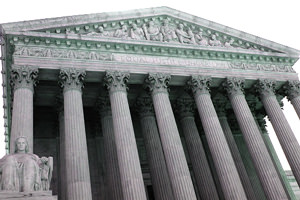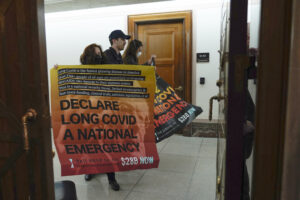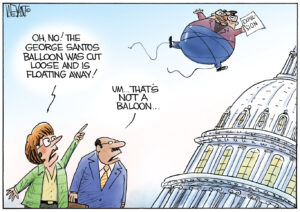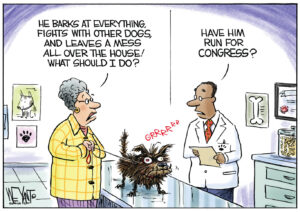A Most Political and Activist Court
The week's judicial work leads to the question of which way the Supreme Court is looking and how the nine justices are using their enormous power, some of it unchecked even by public needs and wishes.
WEST HOLLYWOOD, Calif. — “Give us also the right to our existence!” was a prayer that ends “The Well of Loneliness,” an English lesbian novel by Radclyffe Hall, published in 1928. Tame by today’s standard, the semi-autobiographical book was banned in Great Britain and had great trouble finding an American publisher.
It was not the only “sexual inversion” — that was the phrase in those days — book published that year in English, but it was the one that caused a tsunami of controversy in the English-speaking world, with writers and politicians taking sides on whether it was literature or pornography.
During a meeting that year at The New York Times, Arthur Hays Sulzberger brought up the book, arguing that the Times should review it. “No,” answered the boss, his father-in-law, Adolph Ochs. When the meeting ended, according to “The Trust,” a history of the newspaper by Susan Tifft and Alex Jones, Ochs turned to his son-in-law and asked, “What the hell is a lesbian?”
Well, everyone must know after last Wednesday’s Supreme Court decision: Lesbians are people, American like everybody else. So gay couples, woman and woman, man and man, will get the same official treatment on the federal level as anyone else, and they will be able to marry in 13 states — and more soon enough.
Before Wednesday’s announcement, I thought that whatever the Supreme Court in its wisdom decides this time won’t matter in the long run. The change has come in individual decisions by millions of people. (I’d add that those decisions are influenced as well by popular entertainment depictions of gays and lesbians as regular folk, neighbors.) That driving force in the marriage case is the same as in disputes and debates about immigration, legal and illegal. In both cases, the dams of law and discrimination are up against forces many leaders cannot defeat. That force, or fact, unrecognized by many politicians, is that the legal and illegal immigrants are related; they are family. The same is true of attitudes toward homosexuality: Gays and straights are related; they are family.
The moral of the story, I suppose, is that lawmakers and judges tend to look backward, at tradition and “precedents.” The future is the other way. Deal with it. Former Vice President Dick Cheney and Sen. Rob Portman had to when members of their families declared they were gay.
The week’s judicial work, however, leads to the question of which way the Supreme Court is looking and how the nine justices are using their enormous power, some of it unchecked even by public needs and wishes. The Tuesday decision to gut the Voting Rights Act takes the country back to some of our worst instincts: the tyranny of the majority, the oppression of minorities.
At least five of the nine claim just the opposite but are, in fact, “activist judges.” This time, in overruling history, precedent and laws, the “conservatives” decided that Congress is using old data in making sure all citizens get a fair shot at voting. That is certainly arguable, but it is a matter of public policy, not constitutional law. And public policy is the business of the public, their representatives in Congress and in the White House. A reader named Andrew Weiss wrote this to the Los Angeles Times:
“We have more proof that these nine judges are indeed partisan,” he wrote. “Whatever happened to doing the right thing? … It’s time put an end to the fantasy that the court isn’t just a nine-member legislative body.”
© 2013 UNIVERSAL UCLICK
Your support matters…Independent journalism is under threat and overshadowed by heavily funded mainstream media.
You can help level the playing field. Become a member.
Your tax-deductible contribution keeps us digging beneath the headlines to give you thought-provoking, investigative reporting and analysis that unearths what's really happening- without compromise.
Give today to support our courageous, independent journalists.






You need to be a supporter to comment.
There are currently no responses to this article.
Be the first to respond.